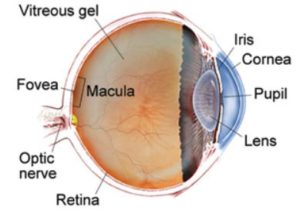This post is mainly for my older friends. Younger people don’t have to worry about it yet. The point is to let you know that you should not assume that any unusual vision problems are the most dire possibility.
During the last month, I have experienced a kind of blurriness in my vision. The best way I can describe it is like when you look into a light. After the initial blind spot fades, you’re left with a residual spot in your vision for a few minutes. It was also like I had a smudge in the middle of both lenses of my glasses. I spent about a month worrying that it might be the beginning of macular degeneration, retinal detachment or cateracts. It is a result of aging eyes, but the condition is not that serious.
It turns out that I have a condition known as Vitreomacular Traction Syndrome. After visaiting my regular optometrist, I had to see a retina specialist to confirm it.
Your eye is filled with a substance called vitreous gel, surrounded by the vitreous cortex. In younger eyes, the cortex is attached to the retina, but as we age, the vitreous gel contracts and the cortex begins to separate from the retina. This is normal and does not affect our vision significantly. In cases such as mine, the cortex may be stubborn about separating and it can pull on the retina at the macula, causing the distortion in vision.
 Although more serious complications can occur, the first thing to do is wait and see whether the separation process completes on its own. I will go back in a month for another exam, and meanwhile, I may have put up with the distortion. If it doesn’t resolve on its own, the doctor told me that there are several ways this condition can be treated, including the possibility of surgery, but for now, I just wait.
Although more serious complications can occur, the first thing to do is wait and see whether the separation process completes on its own. I will go back in a month for another exam, and meanwhile, I may have put up with the distortion. If it doesn’t resolve on its own, the doctor told me that there are several ways this condition can be treated, including the possibility of surgery, but for now, I just wait.

I probably need cataract surgery but am putting it off long as I can. Several years ago I started seeing subtle flashes of light when checking my right hand mirror driving at night, opthomoligest said it is something to do with the vitreous jell – don’t recall just what – but my mind would learn to ignore thr false signals.
I just got checked for cataracts and, while I do have some forming, I don’t need to do anything for at least a year. But you’re describing something I’ve been experiencing for awhile, especially after reading.
I am thankful for my optometrist. The symptoms were subtle. Her suspicions arose from comparing this year’s photo of my retina to last year’s. She showed me the photos but I couldn’t see any difference. She did not have the instrument needed to confirm it, so she sent me to the specialist. Coincidentally, I was reading a back issue of the AARP magazine yesterday. An article on Aging Eyes does not mention this condition. Maybe you should have your optometrist look again.
My blurred vision was cararacts so surgery was done although it still is sometimes blurry because of scar tissue around the new lens! So hang in there and I hope it resolves itself.
Me too!